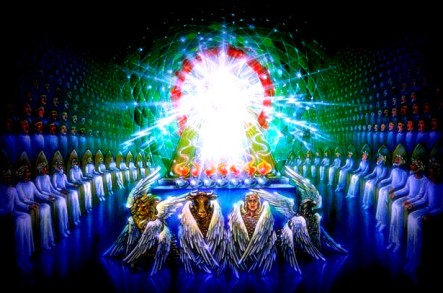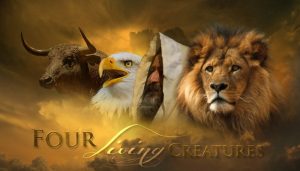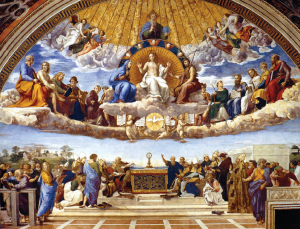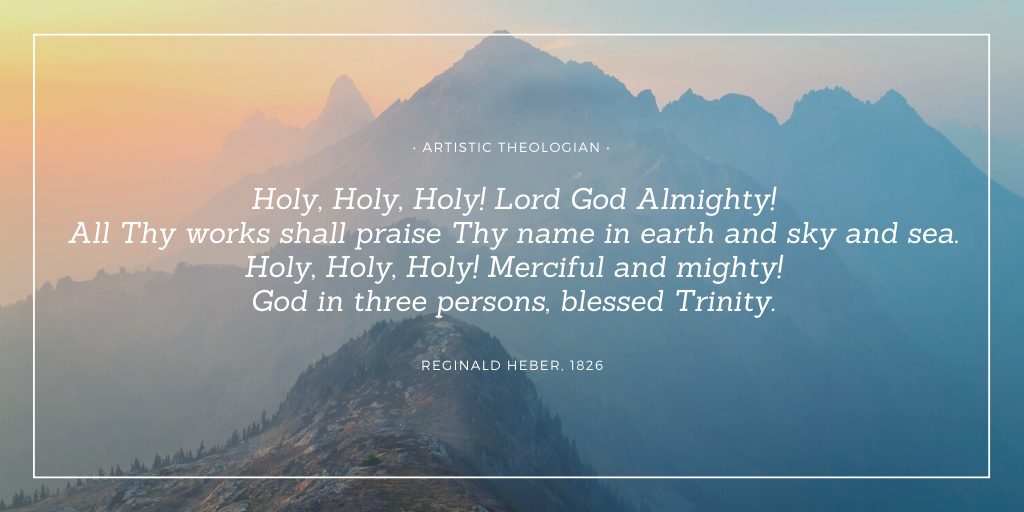
Pastor Rich Knight
Central Congregational Church, UCC
Sept. 26, 2021
Revelation 4
“Until now the symbols in Revelation have been relatively straightforward and their meaning relatively easy to understand. From here onward they become more difficult and complex. Nevertheless, by using a disciplined imagination one can follow the author’s meaning, at least to some degree.” – Bruce Metzger, preeminent New Testament scholar
Revelation 4
After this I looked, and there in heaven a door stood open! And the first voice, which I had heard speaking to me like a trumpet, said, “Come up here, and I will show you what must take place after this.” 2 At once I was in the spirit,[a] and there in heaven stood a throne, with one seated on the throne! 3 And the one seated there looks like jasper and carnelian, and around the throne is a rainbow that looks like an emerald. 4 Around the throne are twenty-four thrones, and seated on the thrones are twenty-four elders, dressed in white robes, with golden crowns on their heads. 5 Coming from the throne are flashes of lightning, and rumblings and peals of thunder, and in front of the throne burn AR0038 – Air Jordan Super.Fly MVP PF 'White' , 100 – The outsole of the Air Jordan 5 Low Doernbecher Freestyle – JmksportShops seven flaming torches, which are the seven spirits of God; 6 and in front of the throne there is something like a sea of glass, like crystal.
Around the throne, and on each side of the throne, are four living creatures, full of eyes in front and behind: 7 the first living creature like a lion, the second living creature like an ox, the third living creature with a face like a human face, and the fourth living creature like a flying eagle. 8 And the four living creatures, each of them with six wings, are full of eyes all around and inside. Day and night without ceasing they sing,
“Holy, holy, holy,
the Lord God the Almighty,
who was and is and is to come.”
9 And whenever the living creatures give glory and honor and thanks to the one who is seated on the throne, who lives forever and ever, 10 the twenty-four elders fall before the one who is seated on the throne and worship the one who lives forever and ever; they cast their crowns before the throne, singing,
11 “You are worthy, our Lord and God,
to receive glory and honor and power,
for you created all things,
and by your will they existed and were created.”
Before we dive into the heart of the passage, let me comment on two details from this chapter.

The Throne of Heaven
In Biblical days heaven was often pictured as having a throne room, with God or Jesus Christ sitting on the throne.
They lived in a world of Kings & Queens and Emperors calling the shots, so it was only natural that they’d describe God in this way.
The Four Living Creatures
Much has been written about these creatures. The appear five more times in the Book of Revelation. They are also referred to elsewhere in the scriptures, such as Ezekiel 10:2.

The Lion is the noblest of animals.
The Ox is perhaps the strongest.
The Human is perhaps the wisest among the creatures (although, some days you wonder)
The Eagle is ruler of the air.

Four Gospels (Matthew? Mark? Luke? John?)
Many of the Early Church writers believed that each animal represented one of the Gospels. Matthew was the Lion, since he presents Jesus as the King of the Jews. John’s Gospel was the Eagle because John’s view of Christ soars the highest.
The best explanation I’ve found regarding the Four Living Creatures is they stand for humanity and nature praising God together. “The ceaseless activity of nature under the hand of God is a ceaseless tribute of praise.”
Our topic this morning is heavenly worship.
First, a little story.
Rabbi Harold Kushner tells the story is told of a tailor who visited his rabbi with a question about prayer.
He said: “It’s like this, Rabbi. If someone approaches me and says, ‘Mendel, you’re a wonderful tailor,’ that makes me feel great. I feel appreciated. I can feel good all week long on the strength of a compliment like that.
But if many people were to come, day after day, hour after hour, and they all kept saying, ‘Mendel, you’re a wonderful tailor,’ it would drive me crazy.
I would soon get sick and tired of hearing it, and I would want them to get lost and leave nike ja 1 scratch me alone.
“So… this is my problem with prayer. It seems to me if we told God how wonderful he is once a week or so, and only one or two of us at a time, that would be all he would need or want.
Should we imagine that God is so needy and insecure that he needs all of us praising him every day, three times a day, morning, noon, and night?
And if not, then why aren’t we driving him crazy?”
The rabbi smiled and said, “Mendel, you are totally right.
You have no idea how difficult it is for God to listen to all of our praises, hour after hour, day after day.
But God understands how profoundly we need to utter that praise; so in his great love for us, he puts up with all of our prayers.”
God “puts up” with all our prayers and all our praise because Lord knows we need it.
Worship is good for us in so many ways! Worship opens us up to life, to love, to community, to grace, to joy, to goodness jordan luka 3 colorways release dates, to God! Worship awakens our spirits, engages our minds, enlivens our souls, and fills our hearts & unites us w God!
The Book of Revelation gives us several visions of heaven, especially chapters 4 & 5. In John’s Visions, Heaven is a place of worship.
Webster’s dictionary defines “worship” this way:
- to honor or show reverence for a divine being or supernatural power
- to regard with great or extravagant respect, honor, or devotion

Worship has the same root as worth. Worship is declaring the “worth” of God.
Rev. 4:11 – “You are worthy, our Lord and God, to receive glory and honor and power.”
God is worthy of our praise. When we worship we are proclaiming God’s worth to us.
The Hebrew word for worship is shachah, (“shaw-kaw”) which means to bow down or lay prostrate before God. This type of worship is to hold God up with such high esteem, with such deep reverence, that the only proper response is to bow down before God. That’s what the 24 Elders did in the passage – they even took off their golden crowns in a further act of worshipping the one who is truly worthy of our praise. Kneeling & taking off their crowns was an act of worship.
That’s a good reminder that worship is more than singing! Praise is worship, but what if you don’t like to sing or can’t sing? You can still worship!
Illustration. John & his Priest.
Our brother-in-law John is very active in his Catholic Church. He is often up front with the priest, serving as the liturgist, reading scripture, and assisting with Communion. John is a great guy and extremely talented, but he just can’t sing. He can’t carry a tune. His singing is so bad that his priest asked him not to sing. John was throwing the priest off key!
Notice his priest told him not to sing. He didn’t tell him not to worship!
Our prayers are worship.
Being still in the presence of God is an act of profound worship.
Offering our lives to God and asking God to use us, to bend our will to Thy will – all these are acts of worship.
Our giving is an act of worship.
Our studying, learning & reflecting on sacred scripture is an act of worship.
Communion is an act of worship.
If worship is honoring God, then just coming through those doors is an act of worship because you’ve come to honor God! (and you’re tuning in!) – worship on Facebook?
There are 3 Aspects of Heavenly Worship in the passage that I’d like to briefly highlight.

- Heavenly Worship is for an Audience of One.
Soren Kierkegaard, the Danish philosopher & theologian pointed out that we often misunderstand the worship experience. We think the action is between the pew and the pulpit. But that’s not where the heart of the action is.
Illustration. At a previous church someone told me they were walking into the church one Sunday and the person they were walking with, chatting with, said, “I hope Rich is inspirational today.” The person who told me this story then replied, “That’s not the point. We’re not walking in there for Rich. We’re walking in there for God.”
And that’s the point. We come here to meet with God. Kierkegaard said we often view worship like an audience viewing a performance – with the clergy and musicians as the performers and you as the audience. But Kierkegaard said the real audience is God. The clergy are simply prompters, helping you remember your lines nike utah kobe shoe zoom black women sandals, guiding you as to what to say next, as we all come before God. There’s an audience of One, and that’s God. In our passage today, everything is directed to the One on the throne. – that’s our focus, that’s our center.
- Heavenly Worship is focused on the Awesomeness and the Otherness of God.
The awesomeness of God is signified in the vision by thunder and lightening, and having a sea of glass in front of the throne of God. You can’t just walk up to the One on the throne and say, “How you doing, Lord?” Reverence, a sense of Awe is required.
We don’t do awe very well these days. We’re a little too cool for school. Few things awe us today. But the God of the Universe, the Source of all the Love in the Universe, the Creator of all that is, the Trinity, the author of the Good News of Jesus Christ, that God is worthy of our awe!
The Awesomeness of God goes along with the Otherness of God. Did you notice that God is not pictured in the vision? The one on the throne doesn’t have a shape – just looks like bright shining gem stones, beaming from the throne.
To an ancient Jew creating an image of God would be a breaking of Commandment #3 –“ You shall not make for yourself an idol, whether in the form of anything that is in heaven above, or that is on the earth beneath.” They felt it was wrong to picture God – partly because it would be tempting to show God in a human form – but God isn’t human! God’s not a member of our species! God’s not a homo sapien! God’s not the ultimate human, the best of us all rolled into one.
This is where Christianity differs from some of the Eastern religions, where God is reduced, if you will, to the best of the human spirit (I say this to inform, not to put down another religion). There’s a principle of Hinduism that states, “The Atman is the Brahman.” – your eternal soul is the ultimate reality.
But the God of our scriptures is “wholly other.” The word “Holy” speaks to God being distinct, different from us. Holy means set apart and distinct, as well as pure and blameless. And the passage makes a strong point that God is distinct and different from us.
In the First Century, if Jewish teachers wanted to make a strong point, they’d repeat a word twice. “Truly, Truly I say to you.” But if they really, really wanted to make a very strong and important point, they said something three times, such as –“Holy, Holy, Holy is the Lord God Almighty” – the threefold repetition of holy is to stress God’s complete otherness and awesomeness.
“God alone is the holiest, most powerful and everlasting one.” – Metzger p. 51
Heavenly Worship worships a God who is distinct from us and over us, God Almighty.
One last point.

- Heavenly Worship participates in the worship of heaven.
We are gathered before the throne of God this morning, spiritually alongside the 24 Elders and the Four Living Creatures, and all the company of heaven. The 24 Elders lay down their crowns as an act of total submission to God. When we pray, “Thy will be done” in my life, “Thy Kingdom come” through me, we’re joining those 24 elders in bowing down and submitting our lives to God.
One other beautiful sign that our worship participates in the worship of heaven.
Rev. 5:8 – “The four living creatures and the twenty-four elders fell before the Lamb (Jesus), each holding a harp and golden bowls full of incense, which are the prayers of the saints.”
“Saints” is a New Testament title for all believers. So the prayers of the First Century persecuted band of Christians – their prayers made it all the way to heaven! The “golden bowls full of incense, which are the prayers of the saints.” – imagine how they felt hearing that back then! Their prayers and ours are mingled with the praise of the angels, the 24 Elders, the Four Living Creatures, and all the company of heaven!
There’s a wonderful line in traditional communion liturgies: “And so with angels and archangels, prophets and martyrs, and all the company of heaven we laud and magnify your holy name.”
Worship is one of the times when we can feel closest to our loved ones in Heaven. They’re worshipping in heaven, and we are singing along with them!
They sing, “Holy, Holy, Holy” and so do we.
They sing, “Thou art worthy” and so do we.
That’s Heavenly Worship according to John’s vision of heaven.
–It’s addressed to an audience of One.
–It’s focused on the awesomeness and otherness of God.
–It participates in the worship of heaven.
Just like the people of the First Century, we need this kind of worship, heavenly worship, to help us live God-centered lives.
Mendel’s Rabbi was right: God puts up with all our prayers and praises, because God knows we need it.
Think about it. Let’s pray about it.
Thank You, Holy God, for the privilege of worshipping with the angels and all the company of heaven. Help us to remember that we are on sacred ground, and let us be filled with wonder and awe, love and praise. Amen.

Closing Hymn: “Holy, Holy, Holy, Lord God Almighty.”
Before we sing our closing hymn, I want to point out that it’s based on the passage we just studied.
The first line is a direct quote of vs. 8 – “Holy, Holy, Holy, Lord God Almighty.”
Vs. 2 – “casting down their golden crowns” refers to vs 10, where the 24 elders fall before God and lay their crowns at the foot of the throne. It’s an act of humility, honor and worship.
They cast their golden crowns “around the glassy sea.”
That refers to vs. 6 – around the throne is a sea that is so smooth and shiny that it looks like glass.”
Vs 2 of the hymn also mentioned “cherubim & seraphim” which are heavenly beings mentioned many times in scripture.
Rev. 5 says the many angels surround the throne and sing their praise to God.
Holy, Holy, Holy! Lord God Almighty!
Text: Reginald Heber
Music: John B. Dykes
- Holy, holy, holy! Lord God Almighty!
Early in the morning our song shall rise to thee.
Holy, holy, holy! Merciful and mighty,
God in three persons, blessed Trinity!2. Holy, holy, holy! All the saints adore thee,
casting down their golden crowns around the glassy sea;
cherubim and seraphim falling down before thee,
which wert, and art, and evermore shalt be.3. Holy, holy, holy! Though the darkness hide thee,
though the eye of sinful man thy glory may not see,
only thou art holy; there is none beside thee,
perfect in power, in love and purity.4. Holy, holy, holy! Lord God Almighty!
All thy works shall praise thy name, in earth and sky and sea.
Holy, holy, holy! Merciful and mighty,
God in three persons, blessed Trinity.
